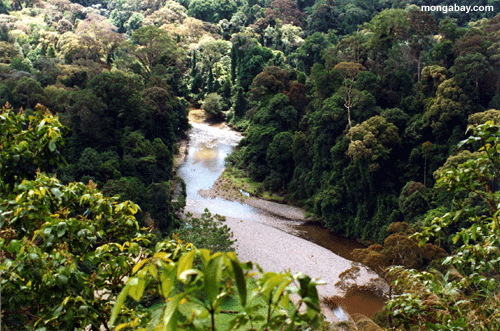Ethnologists attempt to show forest dwellers perils of leaving the rain forest
Borneo’s ancient jungles offer new insight into modern life: it sucks
© AFP. All Rights Reserved.
May 5, 2005
 Rainforest in Borneo |
MALINAU, Indonesia (AFP) – Many of us suspect it as we trudge to work in the morning, but scientists studying some of the last primitive tribes in deepest Borneo say they now have proof — modern life is, indeed, rubbish.
A team of experts has spent months comparing the lives of the Punan people, who still live as hunter-gatherers in the forest of Indonesian Borneo, with those of tribe members who have been lured away by civilisation.
Not surprisingly, many of the Punan’s dreams are dashed on arrival in the big city, however the scientists say that even basics like food, health and quality of life also turn out to be much worse in town than the forest.
While it is unlikely the findings will encourage jaded office clerks to shed their suits and head for the jungle, researchers hope they might preserve ancient traditions by warning the Punan and other tribes what they risk losing.
“They want modern life, they want to wear T-shirts and jeans and drink Coca-Cola, they are attracted to all these things,” says Edmond Dounias, of Centre for International Forestry Research team.
“But what they underestimate is what it will cost them in terms of their way of life, their culture and the benefits they gained from the forest.”
Only a few hundred thousand hunter-gatherers remain on Earth, among them the Punan who roam the lowland forests of East Kalimantan in Indonesian Borneo, which despite its lush appearance, is no garden of Eden.
Hazards such as malaria and parasites ensure that only one percent of women and two percent of men reach the age of 65. Infant mortality rates are some of the highest in the world, with a third of children dying under the age of five.
With many Punan — who traditionally stretch their earlobes with heavy brass or gold piercings — now settled in villages, they are more prone to outbreaks of disease than in the past when nomadic lifestyles kept them isolated.
According to 2003 statistics there were 8,956 Punan in East Kalimantan, of which 4,500 are now living in and around Malinau.
For more than two thirds of Punan questioned by Dounias and his team of ethnologists, access to healthcare is reason enough to pack their meagre belongings into a dugout canoe and paddle down river to the nearest city.
Their destination is Malinau, a boom town whose population has leapt from 20,000 to 50,000 in four years as migrants pour in to work in the nearby coal mines and the lucrative, and often illegal, logging industry.
In Malinau, 1,400 kilometres (870 miles) northeast of Jakarta, residents live in houses with electricity, wear Western clothes, drive cars on recently tarred roads, talk into cellphones and, when they choose to, drink Coca-Cola.
But, says Dounias, once they arrive in the city, many Punan find themselves treated as second-class citizens, unable to afford the healthcare they aspired to and exposed to problems like drug and alcohol abuse.
“They have lost benefits of the forest such as clean water which has become a real problem near the cities because of pollution and use of pesticides,” he says. “They also no longer have access to their culture of mutual aid.”
Robbed of the rich resources of their forest environment, the diet of many Punan also suffers, with their choice of varied bushmeats, fruits and nutritious roots replaced by a limited diet of rice and low-quality meats.
Their tradition of eating regular snacks found in the undergrowth is replaced by consuming unhealthy pre-packaged food such as potato chips or fat-laden cakes, leading some young Punan to develop weight problems.
In an effort to encourage the Punan to stay put, the Centre for International Forestry Research is working with local authorities and medical groups including Medecins du Monde to take medical help to remote villages.
Greg Clough, a communications specialist at the forestry research centre, says the study could help influence government policies over land use, particularly in Kalimantan where precious forests are under threat.
The widespread illegal felling of Borneo’s prized trees are pushing indigenous people to abandon the land they have occupied for centuries, many willingly taking cash and sometimes jobs from the loggers.
“These findings will help decision-makers hopefully make more informed choices. They will have some idea about how their decisions might impact on local people,” Clough said.
Dounias, who presented his team’s findings to local leaders at a meeting in Malinau last month in the hope that they will pass them on to Punan communities, says their study also applies to hunter-gatherer’s worldwide.
© AFP. All Rights Reserved.
This material is used for educational purposes.